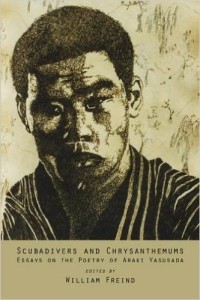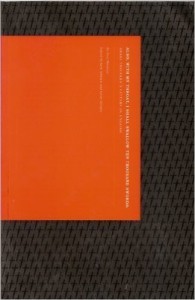Recently, there was a literary scandal when a poem by Yi Fen Chu, chosen for inclusion in Best American Poetry 2015, turned out to be written by Michael Hudson, who said the poem had been rejected 40 times when submitted under his own name; he then got the idea of the Yi Fen Chu alias. Under that name, Prairie Schooner accepted the poem and it made it to the “best” volume. It’s pseudonymity highlighted the current literary bias towards publishing minority, disenfranchised, or foreign writers.
 In the discussion, an older, more complex work came up: the two volumes, one of letters, one of poetry, allegedly by a Japanese survivor of Hiroshima, Akiri Yasusada, whose family was devastated by the blast.
In the discussion, an older, more complex work came up: the two volumes, one of letters, one of poetry, allegedly by a Japanese survivor of Hiroshima, Akiri Yasusada, whose family was devastated by the blast.
After high profile reviews and excerpts from the volumes, his identity turned out to be the biggest literary fraud since Thomas Chatterton’s impersonation of Thomas Rowley, an imaginary monk of the 15th century, complete with fragments on parchment. But was it a fraud, or a construct designed to be discovered?
I was led to Yasusada’s work long after authorship had been consigned to Kent Johnson and possibly Javier Alvarez, University of Chicago students who allegedly invented both Yasusada and his translator, Tosa Motokiyu, both conveniently dead. In Forrest Gander’s essay in A Faithful Existence, he describes the work as this way: “Using modernist strategies, the Yasusada author(s) , steeped in translations of Japanese literature and feeling uneasy, even–if they are American–complicit with the U.S. Foreign policy that generated such mass destruction,invented an imaginative, political, and poetic act of empathy.”
 Whatever you think of this strategy, the letters in Also with my Throat, I Shall Swallow Ten Thousand Words are fascinating, the language fresh, and the play of the footnotes intricate and amusing. It’s too complex to quote at length, but there are a few haiku that give a sense of the imagination at work here. I give both the haiku and the surrounding text. The construct is that they are in a letter from Yasusada in his own fractured English to his “pal-pen” Richard in the United States:
Whatever you think of this strategy, the letters in Also with my Throat, I Shall Swallow Ten Thousand Words are fascinating, the language fresh, and the play of the footnotes intricate and amusing. It’s too complex to quote at length, but there are a few haiku that give a sense of the imagination at work here. I give both the haiku and the surrounding text. The construct is that they are in a letter from Yasusada in his own fractured English to his “pal-pen” Richard in the United States:
walking with the river
the river does my thinking
(One time I was walking by Chiyoda River fishing for trout fish.I thought: the river is my thinking. Small birds, orange and red, were fleeting.)
…
the wind enters
between our voices
(My father said this suddenly to me after we had left behind us the trees.)
Buddha’s granite face
wearing the wind away
(There is a great statue in Afghanistan. The wind can do nothing against it.)
the corpse of a raven whitens the snow
(Neverthemore, a raven is black. It matters not,)
I think these are enough to give you the flavor of this unique work, probably available at a university library near you.